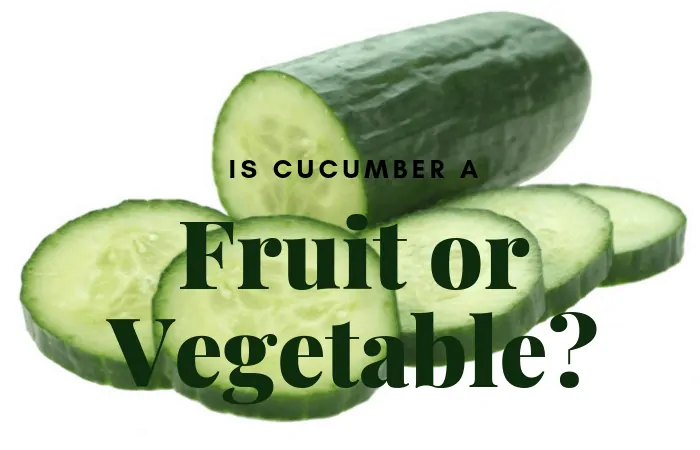The Great Debate: Is a Cucumber a Fruit or Vegetable?
Welcome to the intriguing world of cucumbers, where the age-old debate rages on: Is a cucumber a fruit or a vegetable? In this article, we will dive into the heart of this botanical puzzle, exploring the scientific, culinary, and cultural perspectives that surround cucumbers. By the end of this journey, you’ll have a clear understanding of why cucumbers continue to blur the lines between fruits and vegetables.
Botanical Classification

is a cucumber a fruit
The Science Behind Cucumber’s Identity
To solve the cucumber conundrum, we must first turn to botany. Cucumbers are a prime example of how botanical classifications can challenge our culinary beliefs. In this section, we’ll delve into the technical definitions of fruits and vegetables and examine where cucumbers fit into this intricate botanical puzzle.
The Cucumber’s Characteristics
A Closer Look at Cucumber’s Traits
Before we can determine whether a cucumber is a fruit or vegetable, it’s essential to understand its defining characteristics. We’ll explore the physical features of cucumbers, from their appearance to taste and texture. By the end of this section, you’ll appreciate the unique attributes that make cucumbers stand out in the world of produce.
Historical and Cultural Perspectives
Cucumbers Through the Sands of Time
To truly grasp the significance of cucumbers, we must explore their historical and cultural roles. Throughout history, cucumbers have played a pivotal part in various cultures, from ancient civilizations to modern-day cuisines. In this section, we’ll journey through time to uncover the cultural significance and traditional uses of cucumbers.
Culinary Uses
Cucumbers in the Kitchen: A Culinary Chameleon
Cucumbers are a staple in many kitchens, but how are they used? In this culinary exploration, we’ll unravel the versatile nature of cucumbers. From refreshing salads to crunchy pickles and inventive dishes, cucumbers have a place in a wide array of recipes. We’ll also address common misconceptions about cucumbers in culinary contexts.
Scientific Perspective
Deciphering Cucumber’s True Identity: A Botanical Analysis
Let’s delve deeper into the scientific perspective on cucumbers. Botanists and scientists have a definitive view on whether cucumbers are fruits or vegetables, and it’s rooted in botanical features. We’ll provide natural language explanations of these botanical features and clarify why, from a scientific standpoint, cucumbers are indeed fruits.
The Legal Perspective
Cucumber in Court: Legal Definitions
Beyond the scientific and culinary debates, cucumbers also have a legal identity. We’ll explore how cucumbers are classified in the legal world, including any relevant laws or regulations that dictate whether they are officially considered fruits or vegetables. This section provides insights into the legal implications of cucumber classification.
Common Misconceptions
Unveiling Cucumber Myths and Misunderstandings
As the debate continues, so do the myths and misconceptions about cucumbers. We’ll address some of the common misconceptions that persist, shedding light on why these myths endure and how they affect our understanding of cucumbers’ true botanical identity.
Common Questions About Cucumbers’ Classification
1. Is a cucumber a fruit or a vegetable from a botanical perspective?
Answer: From a botanical standpoint, a cucumber is classified as a fruit because it develops from the ovary of a flower and contains seeds.
2. Why are cucumbers often considered vegetables in everyday language?
Answer: Cucumbers are commonly perceived as vegetables in culinary contexts due to their savory and refreshing taste, which aligns with typical vegetable usage.
3. What is the botanical definition of a fruit?
Answer: Botanically, a fruit is the mature ovary of a flowering plant, typically containing seeds. It develops from the fertilized ovule after pollination.
4. How do cucumbers fit the botanical definition of a fruit?
Answer: Cucumbers fit the botanical definition of a fruit because they develop from the ovary of a cucumber flower and contain seeds within.
5. Are there other fruits commonly mistaken as vegetables?
Answer: Yes, several other fruits, such as tomatoes and bell peppers, are often mistaken for vegetables in culinary terms.
6. Can cucumbers be legally classified as both fruits and vegetables?
Answer: In legal contexts, cucumbers may be classified differently based on regulations and customs, leading to the possibility of them being both fruits and vegetables.
7. How do scientists and botanists resolve the fruit vs. vegetable debate for cucumbers?
Answer: Scientists and botanists categorize cucumbers as fruits based on botanical criteria, emphasizing their reproductive structure and seed-bearing nature.
8. Do cucumbers share any botanical similarities with other fruits?
Answer: Cucumbers share botanical similarities with melons, squash, and pumpkins, all of which are considered fruits due to their origin from flower ovaries.
9. What are some cultural or culinary factors that influence cucumber classification?
Answer: Cultural and culinary factors play a significant role in the classification of cucumbers, as they are often used in savory dishes and salads, aligning with typical vegetable usage.
10. Does the debate over cucumber classification impact their nutritional value or usage in recipes?
Answer: The debate over cucumber classification does not impact their nutritional value or usage in recipes. Cucumbers remain a nutritious and versatile ingredient, regardless of their classification.
Conclusion
In this comprehensive exploration, we’ve peeled back the layers of the cucumber mystery. From botanical definitions to cultural significance, culinary versatility, scientific clarity, and legal perspectives, we’ve examined the debate from multiple angles.




